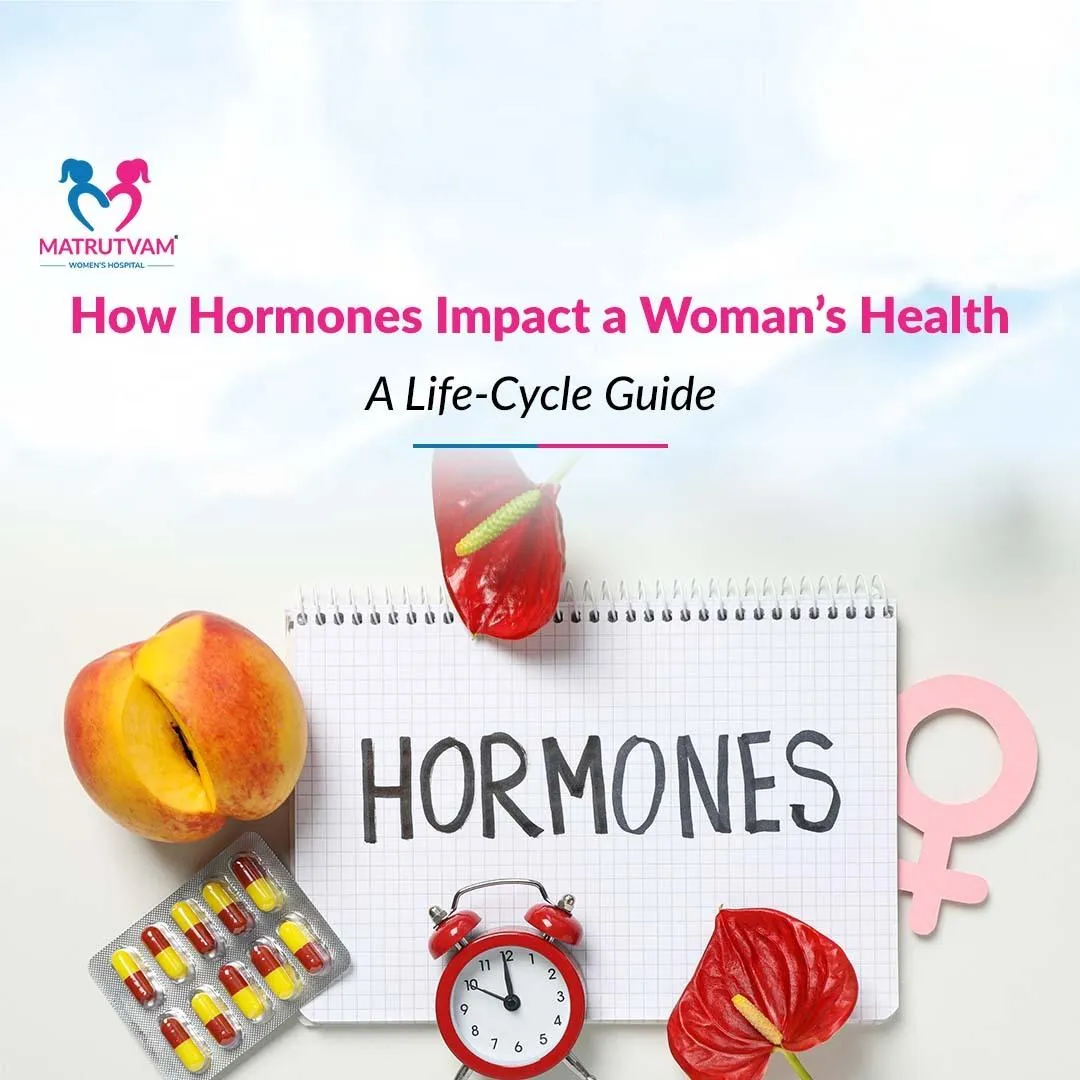
How Hormones Impact a Woman’s Health: A Life-Cycle Guide
Hormones are your body’s messengers. Estrogen, progesterone, testosterone, thyroid hormones, insulin and cortisol rise and fall across life stages, shaping periods, mood, fertility, bones, heart, brain, skin and energy. You can’t “control” hormones, but daily habits can help them work with you.
Foundations at any age
Build a hormone-friendly plate: ½ colourful vegetables + fruit, ¼ protein (dal, eggs, fish, tofu, lean meats), ¼ high-fibre carbs (millets/whole wheat/brown rice) + a thumb of healthy fats (nuts, seeds, olive/mustard oil).
Move with purpose: 150 min/week moderate cardio + 2–3 strength sessions for muscle, insulin sensitivity and bone.
Sleep 7–9 hours: lights down, screens off 60 minutes before bed.
Manage stress: breathwork (4-7-8), a short walk, or 5 minutes of journaling; limit alcohol and smoking.
Labs to know (as advised): CBC/iron, TSH, HbA1c, lipids, vitamin D, B12.
Puberty & Teens (menarche to ~19)
What’s happening: Hormones fluctuate; cycles can be irregular.
Common concerns: Acne, heavy/painful periods, anemia risk.
Balance tips:
Iron-rich foods (leafy greens, beans, eggs) + vitamin-C pairings; omega-3s for skin and cramps.
60 min/day of activity; limit sugary drinks.
Seek care for very heavy bleeding (soaking pad/tampon <2–3 hours), severe pain, or cycles >90 days apart.
20s–30s (reproductive years)
What’s happening: Estrogen/progesterone cycle monthly; insulin and thyroid set your energy.
Common concerns: PCOS, PMS, thyroid issues, fertility planning.
Balance tips:
High-fibre carbs, protein at each meal, and strength training improve insulin sensitivity (key for PCOS).
Track cycles; consider folic acid if planning pregnancy.
Red flags: new hair loss, rapid weight change, cycles <21 or >45 days—check thyroid/PCOS.
Pregnancy & Postpartum
What’s happening: Estrogen/progesterone surge; insulin resistance rises; prolactin supports lactation.
Balance tips:
Prenatal plate: extra protein, iron, calcium, iodine, choline, folate; keep caffeine modest; stay hydrated.
Safe movement (walk, prenatal yoga, light strength) unless your obstetrician advises otherwise.
Postpartum: gentle core/pelvic-floor rehab, regular meals, and sleep protection; seek help for low mood >2 weeks.
40s–50s (perimenopause → menopause)
What’s happening: Estrogen and progesterone become erratic, then fall.
Common concerns: Hot flashes, night sweats, mood swings, weight creep, cholesterol rise, bone loss.
Balance tips:
Prioritise protein (1.0–1.2 g/kg/day) and strength training to protect muscle and metabolism.
Calcium (1,000–1,200 mg/day) + vitamin D; add impact work (jumps/hops if joints allow) for bone.
Alcohol and ultra-processed sugar can trigger hot flashes—experiment with reductions.
Discuss options: lifestyle first; consider CBT for sleep/mood, and ask your clinician if MHT/HRT is appropriate for you.
60+ (healthy longevity)
What’s happening: Lower estrogen affects bones, brain, heart and pelvic floor.
Balance tips:
Keep up resistance training, balance (tai chi/yoga), and walking to reduce falls.
Protein at each meal; hydration; fibre for gut health and insulin control.
Bone density (DEXA) and heart-risk checks as advised.
Key hormones—quick cues
Insulin: spiking with sugary/ultra-processed foods → energy dips, cravings.
Balance: fibre, protein, movement after meals.Thyroid (TSH/T4/T3): low levels → fatigue, cold, hair loss; high → palpitations, anxiety.
Check if symptoms persist.Cortisol (stress): chronically high → poor sleep, belly fat, cycle changes.
Balance: daylight, breathwork, strength + gentle cardio, consistent bedtime.Estrogen/Progesterone: imbalances → PMS, heavy periods, hot flashes.
Balance: anti-inflammatory foods (omega-3s, plants), stress/sleep care; discuss medical options if symptoms limit life.
When to see a clinician now
Periods are very heavy, very painful, or missing for 3+ months (not pregnant).
New chest pressure, severe shortness of breath, one-sided weakness/vision changes.
Postmenopausal bleeding.
Depression, anxiety, or sleep problems that last >2 weeks.
Hormones shift; habits steady the ship: balanced meals, consistent movement (with strength), quality sleep, and stress skills. Add regular checkups and targeted labs to personalise your plan. For tailored, women-first guidance, visit matrutvamhospitals.com.
#WomensHealth #HormoneBalance #HormonalHealth #CycleHealth #PeriodHealth #PMSRelief #PCOSAwareness #ThyroidHealth #FertilityJourney #PregnancyHealth #PostpartumWellness #Perimenopause #MenopauseHealth #BoneHealth #HeartHealth #GutHealth #StressManagement #SleepHealth #NutritionTips #StrengthTrainingForWomen #YogaForWomen #HealthyHabits #HealthIndia #MatrutvamWomensHospital
